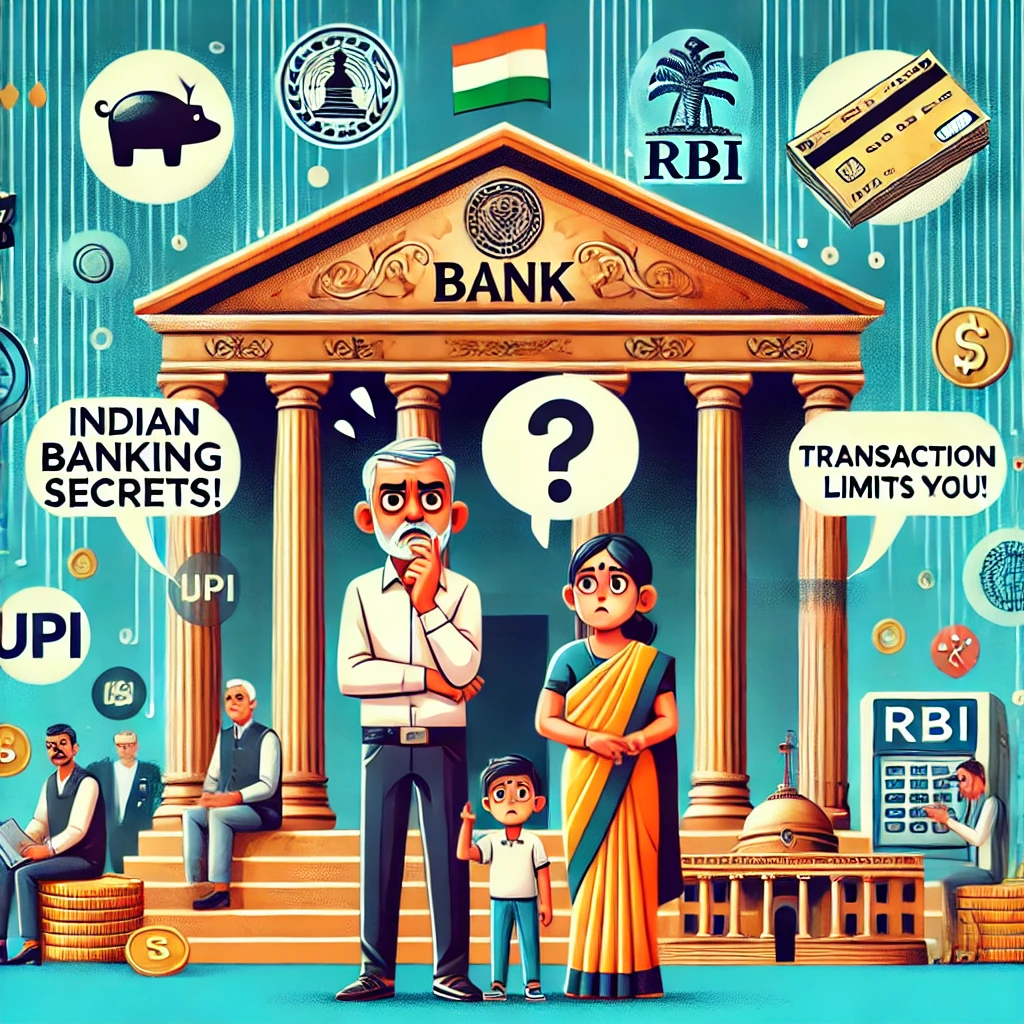Just A+ way to share and acquire business knowledge
No Politics. No religion. No Life Lessons. No fatuous Gratitude. No meaningless congratulatory posts.
“I Have an Offer But I’m Still Interviewing” — How to Not Fumble This Like a Rookie
Ah, the sweet joy of getting a job offer! But wait—you’re still in talks with that other cooler company with bean bags, better coffee, and maybe a higher CTC. Now what? Panic? Ghost everyone? Send a "let me get back to you after Mercury retrograde" message?
No. Let’s not be that candidate.
As a recruitment expert (and someone who’s seen this movie too many times), here’s how to actually handle having an offer while still interviewing—without losing both.
✅ What You Should Do (aka how to be smart, not sneaky)
1. Communicate. Like, Actually Talk.
If you’ve got an offer, don’t disappear on the hiring manager from the other company. Drop a polite, professional note:
"Hey, I’ve received an offer elsewhere, but I’m genuinely interested in your role. Is it possible to expedite the process?"
Recruiters love this honesty—it gives them something to work with.
2. Ask for Time—Politely, Not Dramatically.
It's okay to ask the company that gave you the offer for a few days. No need to act like you’re choosing between Harvard and Hogwarts. Just say:
"I’m excited about the offer. Could I have 3-5 days to make an informed decision?"
That’s it. Simple. Chill.
3. Know What You Want
Before you juggle offers like you're on Shark Tank, ask yourself: What am I really looking for—salary, growth, brand, work-life balance, free snacks? Prioritize. Otherwise, you’ll end up saying yes to the wrong job... and crying at your desk six weeks later.
4. Use the Offer, Don’t Flaunt It
Yes, you can mention an offer during negotiations. No, you don’t need to say things like “I already have a better offer, convince me.” You’re a job seeker, not a Bollywood villain.
❌ What NOT to Do (unless you enjoy chaos)
1. Ghosting Is for Halloween, Not Job Offers
Radio silence after getting an offer is the #1 way to get blacklisted. Respect people’s time. Just reply—even if it’s uncomfortable.
2. Don’t Lie or Fake Offers
Recruiters aren’t fools. They talk, verify, and spot fake CTC slips from a mile away. Lie once, and good luck getting another interview in that network.
3. Don’t Drag Things Out Forever
“Just give me one more week… and another… and maybe one more…” sounds desperate. Most companies won’t wait that long. You’re not buying real estate, you’re choosing a job.
4. Don’t Be That Offer Shopper
Accepting offers just to see who’ll outbid whom is a fast track to being labeled a red flag. Be curious, not greedy.
🎯 Key Takeaway (Straight From the HR Cave)
Having multiple opportunities is awesome—but handling them requires maturity. Be honest, stay professional, and remember: jobs are about long-term fit, not just salary spikes.
Play your cards right, and you could go from "just another candidate" to "the one that got hired and respected."
✨ Don't use these 5 Compelling Strategies or you will land your dream job!
✨ 5 Untold Secrets to Acing Your Job Interview and Landing Your Dream Role!
✨ Only the SMART Ones decline offer without raising Red flags 🚩!!!
✨💡Pat yourself If you’re into these Powerhouses-5 Industries Set to Transform the Nation by 2030 🚀🔥
✨ The Curious Case of the Vanishing Candidate: A Recruiter’s Dilemma
0 Q&A
“Winging It” Is Not a Strategy: 5 Things You Must Do Before Your First Interview (Unless You Love Rejection)
Let’s be real. I’ve lost count of how many candidates show up to their first round of interviews with all the enthusiasm in the world… and zero prep. No idea what the company does, no clue why they’re asking for 18 LPA, and absolutely no questions when asked “Any questions for us?”
Look, I get it—interviews are stressful. But walking into one unprepared is like showing up to a sword fight with a spoon. Through my work as a consultant, I’ve seen what not to do—and now, I’m here to share what you should do. These five moves are your golden ticket to cracking round 1 and making it to round 2 with your head held high.
1. Stalk the Company (In a Non-Creepy Way, of Course)
Before you even think about hitting “Join Meeting,” get to know the company. What do they do? What problem are they solving? Who are their clients? What’s their latest funding round or product launch? This isn’t just trivia—it shows you’re proactive, curious, and actually interested in being there. Interviewers can sniff out a bluff in seconds.
💡 Pro tip: Casually drop in a nugget like,
“I read about your recent acquisition of XYZ. That’s a great move considering your expansion goals in APAC.”
Instant credibility. ✅
Boom. Instant brownie points.
2. Connect the Dots: Your Work + Their Mission
Once you’ve understood what the company is building, ask yourself: “Where do I fit in?” Align your past work, your strengths, or even your future goals with the company’s mission. This isn’t a TED Talk—it’s your chance to say, “Here’s what I bring to the table, and here’s why I care about what you’re doing.” That combo of purpose + alignment = irresistible.
“Your focus on AI in healthcare is something I resonate with. I worked on a similar model during my time at…”
This tells them: “Hey, I’m not just here for a paycheck—I belong here.”
3. Have a Salary Talk With… Yourself
Please, I beg you—don’t fumble when asked, “What are your compensation expectations?” Know your worth, be realistic, and back it up with a reason. Whether it’s skill upgrades, cost of living, or industry standards—have a clear rationale.
And while you’re at it, be ready with a solid answer to, “Why are you looking out?” It shouldn’t sound like you woke up and thought, “Meh, new job?”
4. Revisit Your Greatest Hits
You’d be surprised how many candidates blank out on their own projects. Go back and revisit what you’ve worked on. Know your role, your contributions, any data-driven results, and lessons learned. Bonus points if you can narrate it like a story rather than reading off a resume like it’s a grocery list.
Because nothing’s worse than this moment:
Interviewer: “Tell me about the XYZ project you led.”
You: “Umm… it was in 2021… I think it was about…” 😐
5. Ask Questions—Smart Ones
Interviews aren’t interrogations—they’re conversations. Come prepared with at least 2 thoughtful questions. It shows that you care about the opportunity and want to understand more. Ask about the team culture, growth plans, challenges in the role, or even the company’s future vision. No one wants to hire someone who’s just looking for “any job.”
🎁 Bonus Tip: Light Internet Stalking Is Allowed
Yes, it’s totally okay to ask who your interviewer is. Once you know, do a quick LinkedIn scroll. Maybe you share a common connection, interest, or alma mater.
Starting with:
“I noticed you’ve grown with the company over 5 years—would love to know what’s kept you here.”
...is a great way to break the ice. ❄️
Takeaway
A little preparation goes a long way. You don’t need to rehearse every line like a stage actor, but being intentional shows. You’re not just another CV in the pile—you’re a future colleague, a culture fit, a solution to their problem.
So tell me—what do you think are some must-dos before round 1? Let’s help each other not just survive, but thrive in interviews. Drop your thoughts below! 👇
️✨ Don't use these 5 Compelling Strategies or you will land your dream job!
✨ 5 Untold Secrets to Acing Your Job Interview and Landing Your Dream Role!
✨ Only the SMART Ones decline offer without raising Red flags 🚩!!!
✨💡Pat yourself If you’re into these Powerhouses-5 Industries Set to Transform the Nation by 2030 🚀🔥
✨ The Curious Case of the Vanishing Candidate: A Recruiter’s Dilemma
0 Q&A
💡Pat yourself If you’re into these Powerhouses-5 Industries Set to Transform the Nation by 2030 🚀🔥
As India strides into a new era of economic evolution, certain industries are poised to disrupt the status quo, driving unprecedented growth and innovation. If you're part of these sectors, consider this a nod to your foresight; if not, it's time to take note. Here are five industries set to redefine India's economic landscape in the next 5-8 years. 🌟📊🚀
1. Healthcare Industry 🏥💊
India's healthcare sector is on a meteoric rise, projected to reach $638 billion by 2025, up from $110 billion in 2016. This surge is fueled by a marked increase in lifestyle diseases such as diabetes, heart disease, hypertension, and cancer. The demand for healthcare services and infrastructure has never been higher. 📈🏥💡
Furthermore, the wellness industry is booming, with the fitness and wellness market expected to grow at a 27% CAGR, reaching $12 billion by
2. Insurance Sector 🏦
With the escalating demand for healthcare services, comes a parallel increase in health insurance uptake. 📉
Secondly, awareness is spreading rapidly, thanks to social media platforms like Instagram Reels 🎥 and YouTube Shorts ▶️, which have become instrumental in educating the masses about the importance of health and life insurance. The health insurance market is expected to expand from INR 0.91 trillion in 2024 to INR 1.5 trillion in 2029
3. Renewable Energy ⚡🌞🌍
India's commitment to renewable energy is unwavering, with the sector projected to attract investments worth ₹30.5 lakh crore by 2030
The government's focus on solar, wind, and energy storage solutions is evident in its ambitious target of achieving 500 GW of non-fossil fuel power by 2030. ⚡🔋🌎
The electric vehicle (EV) 🚗⚡segment is also gaining momentum, with investments of ₹25,000 crore anticipated over the next few years, aiming for EVs to constitute a significant share of new vehicle sales by FY2030
4. Technology & IT 💻
The digital transformation wave continues to sweep across India, bolstered by initiatives like "Digital India" 📡, which have expanded digital infrastructure, internet penetration, and digital payment systems such as UPI. The demand for emerging technologies like artificial intelligence (AI) and cloud computing are at an all-time high.
A testament to AI's growing influence is the recent trend of individuals generating "GHIBLI" portraits 🎨 through platforms like ChatGPT, showcasing AI's integration into everyday life
5. Consumer Goods & E-commerce 🍔
The Indian consumer landscape is undergoing a seismic shift, driven by:
✅ Increased internet penetration
✅ Smartphone adoption
✅ Changing consumer behaviors
✅ The convenience of online shopping
✅ Globalization of trade
✅ Development of digital payment solutions
This transformation presents vast opportunities for businesses and investors alike. 📈💼
As these industries gear up to redefine India's economic fabric, the question arises: Which of these burgeoning sectors aligns with your aspirations💭?🚀🔍💡
Whether you're an employer, employee, company, youth, investor, or analyst, the time is ripe to position yourself in the vanguard of India's economic revolution.
---
References & Sources
1. Financial Express - Indian Healthcare Market
2. Zee Biz - Renewable Energy Investments
3. Financial Times - Renewable Energy Challenges
4. Economic Times Energy - EV Market Projections
0 Q&A
Is India’s IT industry slowing down? The Tech Monsoon Is Here!
India's IT sector, once the undefeated champion of our economic story, is facing its very own
mid-life crisis. For decades, it was the goose that laid golden chips (pun intended), but today, it
finds itself weathering some harsh storms. Here’s why the IT sector seems to be stumbling
and, let’s be honest, it’s not just about AI.
1. The Financial Bubble: Overfeeding the Goose
India has shovelled resources into IT for decades like there’s no tomorrow. Did someone say,
“Starve thy neighbour”? Yes, our love for IT left deep-tech and manufacturing gasping for
oxygen. Imagine throwing lavish banquets for one family member while others survive on
crumbs. The result? Sectors like chemical and mechanical engineering grew anaemic, while IT
became the celebrity everyone invites to parties.
2. AI Disruption: The Rise of the Bots
Artificial intelligence has entered the scene with all the subtlety of a dinosaur at a garden party.
Automation is replacing repetitive tasks, making entire job roles obsolete. IT companies
grappling with overcapacity and inefficiency are shedding their human workforce and filling
roles with shiny algorithms that don’t need breakfast, lunch, and chai breaks every two hours.
Data Check: India’s IT workforce saw a decline of over 6% in entry-level positions over the last
year, while automation increased productivity by 30% in some operations.
3. Valuation Obsession: Unicorn Fever
Startups are chasing billion-dollar valuations harder than a dog behind a car. The obsession
with becoming unicorns has caused a neglect of that tiny thing called "profitability." When
revenue becomes an afterthought, sustainability gets shoved out the door. Would you rather
have an actual cash cow or a mythical horned horse? India picked the unicorn.
So, how do we clean this mess?
There’s hope on the horizon if we act now. But we have to hit some key buttons fast:
● Shift Focus to Products: The days of relying only on outsourcing are over. We need
products that make waves globally, think AI platforms, advanced hardware, and core
technologies.
● Investment Beyond IT: It’s time to invest in diversified industries such as AI, robotics,
bio-tech, you name it. Let’s put "Make in India" into hyperdrive!
● Revenue First: Forget vanity metrics; profitability and sustainability need to be our
guiding stars. Remember, “apna sapna money money”
Data Check: India needs to accelerate investments in non-IT sectors; right now, just 12% of its
venture capital flows into hardware or deep tech.
Final Thought:
Let’s face it, India’s IT sector isn’t going anywhere, but its glory days might be behind it unless it
pivots quickly. If we play our cards right, though, the IT sector can evolve into something even
more robust, something truly forward-looking.
India, it’s time to create, not just deliver. Let’s move from being the service champs to the
innovation leaders. The golden goose isn’t dead, but it’s just in desperate need of a change in
diet. I mean, now that I think I used a bit of AI to make this article a bit better but that doesn't
mean I won't get a job as a content writer.
0 Q&A
Indian Semiconductor Firms Eye Global Talent to Drive Growth
India's semiconductor industry is witnessing a transformative shift as companies actively seek global talent to strengthen their operations within the country. With a growing emphasis on chip manufacturing and design, Indian semiconductor firms are scouting skilled professionals worldwide to bring expertise in chip design, fabrication, and supply chain management.
Why is India Seeking Global Talent?
1. Expanding Semiconductor Ecosystem
With government incentives such as the ₹76,000 crore semiconductor mission, India is setting up fabrication plants, advanced packaging units, and design centers. These initiatives aim to establish India as a global semiconductor hub.
2. Addressing the Talent Shortage
While India has a robust base in chip design, there is a shortage of experienced professionals in semiconductor fabrication and advanced manufacturing. Bridging this talent gap is essential to accelerating the industry’s growth.
3. Global Collaboration
To compete with leading semiconductor nations, Indian companies are leveraging expertise from established hubs like Taiwan, the U.S., and South Korea. This collaboration ensures knowledge transfer and skill enhancement.
4. Strategic Partnerships
Indian firms are recruiting foreign experts for leadership roles to guide the nation’s semiconductor transition. Their experience in setting up and managing world-class facilities is invaluable in India’s semiconductor journey.
Major Developments in India’s Semiconductor Industry
🔹 Tata Group, Vedanta-Foxconn, and Micron have announced semiconductor investments in India.
🔹 ISMC and IGSS Ventures are exploring semiconductor fabrication plant setups.
🔹 Government initiatives like Design-Linked Incentives (DLI) and Production-Linked Incentives (PLI) are attracting global semiconductor players to invest in India.
Challenges in India’s Semiconductor Push
Despite the rapid advancements, the industry faces key challenges:
🔹 Skill Development: Training and developing a local workforce with expertise in semiconductor fabrication and high-tech manufacturing.
🔹 Infrastructure: Ensuring stable power supply, reliable water resources, and seamless logistics for semiconductor production.
🔹 Global Competition: Competing with well-established semiconductor giants like Taiwan and South Korea, which have decades of experience and advanced supply chain ecosystems.
The Road Ahead
India’s semiconductor mission is gaining momentum, and attracting global talent will be a game-changer in making the country a competitive player in the global semiconductor industry. By fostering skill development, strengthening infrastructure, and forming strategic partnerships, India can establish itself as a leading semiconductor powerhouse in the years to come.
With international collaboration and government-backed initiatives, India is positioning itself at the forefront of semiconductor innovation and manufacturing
0 Q&A
Only the SMART Ones decline offer without raising Red flags 🚩!!!
Declining a Job Offer Without Burning Bridges–5 Niche Strategies 😃
1) Never Ghost the Recruiter – Silence isn’t professional; always respond, even if it’s a simple “Thank you, but I’ve decided to move in a different direction.” Click here to know more- Candidate Ghosting ❌
2) Make It Personal with a Call – A quick call shows respect, professionalism, and keeps the door open for future opportunities.
3) Be Transparent About Your Decision – If another offer aligns better with your goals, let the recruiter know—you might be considered for an even better role later.
4) Respect Their Time, Be Honest – Avoid fabricated excuses; recruiters value sincerity and will appreciate a well-communicated rejection.
5) Ask for Time (But Don’t Drag It) – If you need to think, request a reasonable timeframe, but don’t prolong if you’re certain about declining.
💕 You Deserve a Bonus tip!! ❤️
6) Express Gratitude & Keep the Connection Alive – A simple “I truly appreciate the opportunity and hope to stay in touch for future roles” can make all the difference.
🔹 Declined an offer recently? Share how you handled it! #JobSearch #CareerTips
👉 Want a Part 2 with more insider insights? Let me know in the comments! ⬇✨✨✨️
️✨ Don't use these 5 Compelling Strategies or you will land your dream job!
✨ 5 Untold Secrets to Acing Your Job Interview and Landing Your Dream Role!
0 Q&A
Don't use these 5 Compelling Strategies or you will land your dream job!
Switching jobs is a significant career move, and how you present your reasons for doing so can make or break your chances of landing your next opportunity. Unfortunately, many candidates fall into the trap of using generic responses like “Looking for professional growth” or “Seeking new challenges” While these reasons are valid, they are overused and fail to set you apart from the competition.
As an experienced recruitment consultant, I have curated 5 ways you can effectively communicate your reasons for a job change without sounding cliché or raising red flags.
How Long Should You Stay at a Job Before Switching?
While there is no strict rule, an ideal stint at a company is around 2-3 years before switching. This time frame allows you to build expertise, contribute meaningfully, and demonstrate commitment while keeping your career progression dynamic. If you switch jobs too frequently (under a year), it may raise concerns about stability. However, if you have valid reasons, always be ready to explain your career moves strategically.
1. Addressing Workplace Culture Without Criticizing
One of the biggest challenges candidates face is navigating toxic workplace environments without badmouthing their employer. Criticizing a previous workplace can make recruiters question your professionalism and discretion. Instead, focus on what you’re looking for rather than what you’re leaving behind.
Better way to frame it: “I value a work culture that fosters collaboration and professional development. While I have learned a lot in my current role, I am looking for an environment that aligns better with my long-term career aspirations and work values.”
This response keeps it professional, avoids negativity, and shifts the focus to your future goals.
2. Aligning Your Goals With the Company’s Vision
If you know the company you are applying to, research its mission, projects, and industry trends to tailor your response accordingly. This helps demonstrate alignment and shows you’ve done your homework.
Example: “I have spent the last three years at XYZ Company, working on [specific projects]. Through this experience, I’ve gained in-depth knowledge of [industry/process]. Now, I’m keen to leverage my expertise in a company that specializes in AI-driven solutions, as I believe AI is the future and aligns perfectly with my skill set and aspirations.”
If you don’t know the company’s specifics, you can use a more general approach:
Example: “I am looking for opportunities that allow me to apply my skills in a dynamic and fast-growing industry, where I can contribute to meaningful projects and continue evolving as a professional.”
3. Turning a Company Shutdown Into a Positive Narrative
Company closures or downsizing can feel like a setback, but you can reframe the situation as a learning experience and a stepping stone to new opportunities.
Better way to frame it: “My previous company underwent restructuring due to market changes, which led to the business shutting down. While this was an unexpected shift, it allowed me to broaden my perspective, adapt quickly, and explore new avenues where I can contribute my skills effectively.”
This response focuses on adaptability and resilience, rather than uncertainty.
4. Reframing Job Insecurity as Proactiveness
Feeling uncertain about job stability is a common concern, but mentioning insecurity outright can make it seem like you’re a risky hire. Instead, frame your decision as a proactive step towards stability and career growth.
Better way to frame it: “The industry I’m currently in is experiencing significant changes, and I want to take a proactive approach by seeking opportunities that offer long-term career growth. I am looking for a role where I can make a lasting impact and continue developing my expertise.”
This shifts the focus from fear to strategic career planning.
5. The Right Way to Respond to Being Laid Off
Layoffs happen, but your response can determine how recruiters perceive you. Want to know the best way to navigate this conversation?
👉 Click here to read our detailed guide on responding to layoffs: 5 Untold Secrets to Acing Your Job Interview and Landing Your Dream Role
Final Thoughts
The way you pitch yourself during a job transition can shape the recruiter’s perception of your professionalism, stability, and career aspirations. Avoid generic statements and instead, frame your reasons in a way that highlights your growth, adaptability, and strategic career planning.
Go ahead and let us know the worst scenario you have encountered in an interview and how you tackled it!
0 Q&A
Tips & Tricks every Indian should know Ft. Banks!
Here are 4 essential tips & tricks for every middle-class individual to navigate the banking system in India, avoid income tax scrutiny, and stay financially secure:
1. Keep Your Deposits Below Key Thresholds
- Avoid depositing more than ₹10 lakh in a savings account within a financial year. Deposits beyond this may trigger Income Tax scrutiny.
- For current accounts, avoid cash deposits above ₹50 lakh per year to prevent unnecessary IT notices.
Tip: If you need to deposit a large amount, spread it across multiple family members' accounts to stay below these limits.
2. Cash Deposit & Withdrawal Limit
- You can deposit up to ₹49,999 in cash in a single transaction without providing a PAN card. Deposits above ₹50,000 require PAN details to comply with tax regulations.
- You can withdraw up to ₹50,000 in a day from a savings account without additional verification. Withdrawals above ₹1 lakh per day may require extra authentication or reporting.
Tip: If you earn extra money (e.g., freelancing, side business), consider opening a current account instead of using a savings account to avoid tax scrutiny.
3. Maintain a Clean & Simple Financial Trail
- Avoid sudden large transactions that don’t match your income pattern. The IT department monitors accounts for unusual activities.
Tip: If you’re receiving large sums (from relatives, rent, etc.), keep records and label transactions properly (e.g., "Gift from Father" or "Rent Payment Received").
4. Be Smart About Fixed Deposits & Savings
- Interest on FDs above ₹40,000 per year (₹50,000 for seniors) is subject to TDS.
- Savings account interest above ₹10,000 per year is taxable, so consider investing in tax-free instruments like PPF or Sukanya Samriddhi Yojana if eligible.
Tip: To avoid deductions, split your deposits across multiple banks or use tax-saving instruments like PPF or EPF.
By following these simple yet effective tips, you can stay under the radar, avoid unnecessary tax scrutiny, and manage your finances wisely.
Let us know which of these tips was most helpful to you 😊! Now you know better how to manage your banking activities and save yourself from unnecessary charges. Stay informed, stay smart! 💡💰
------------------------------------------------------------
Job Seekers - Get your hands on some of the most niche, unspoken job strategies that no one talks about—until now
Recruitment turned into Horror- Treat yourself with a horror story that will get you take the right decision!!
0 Q&A
Workplace Culture: More Than Just Words, It’s What You Feel
Culture isn’t a checklist.
You can have:
✅ A mission statement that says, "We value employees."
✅ Monthly feedback surveys.
✅ "People First" in every email footer.
And still… employees don’t feel valued, heard, or safe. 😶🌫️
I know because I’ve been on both sides—fixing broken cultures and building new ones.
In 4+ years in HR, I’ve:
🔹 Transformed struggling workplaces.
🔹 Built people-first cultures from scratch.
I’ve seen what works:
✨ Trust that’s felt, not just talked about.
✨ Feedback that’s welcomed, not feared.
✨ Employees staying because they want to, not because they have to.
And I’ve seen what doesn’t:
❌ Leaders who only listen when people quit.
❌ HR acting as policy enforcers, not culture builders.
❌ Employees feeling like numbers, not humans.
Real culture isn’t what’s written down—it’s what’s lived every day.
It’s when:
💡 A junior speaks up without fear.
💡 A mistake leads to coaching, not blame.
💡 A resignation is a transition, not a betrayal.
This isn’t theory. It’s what I do, what I’ve done, and what I’ll keep doing.
👉 What’s one workplace culture shift that changed how you felt at work?
0 Q&A
5 Untold Secrets to Acing Your Job Interview and Landing Your Dream Role
Let’s face it—interviews can be terrifying. Sweaty palms, racing heart, and that dreaded “Tell me about yourself” question. But what if I told you that acing an interview isn’t just about your resume or how well you recite your strengths and weaknesses? There are some niche, unspoken strategies that no one talks about—until now.
I’ve observed, analyzed, and uncovered five golden rules that can turn an average candidate into an employer’s top choice. Whether you're a job seeker, an employer, or an employee looking to level up, these insights will shift the way you approach hiring and interviews.
1. Never Say “I Was Laid Off”—Tell a Story Instead!
Look, layoffs happen. But the moment you say “I was laid off,” it’s like a silent alarm goes off in the recruiter’s mind. Even if the layoff had nothing to do with your performance, it automatically triggers doubt.
Instead of focusing on the past, flip the narrative to highlight your growth:
❌ “I was laid off due to company downsizing.”
✅ “Over the years, I’ve built XYZ projects, contributed to ABC strategies, and now I feel ready to explore new opportunities that align with my evolving skills.”
See the difference? You sound confident, proactive, and in control of your career. Always frame your transition as an opportunity, not a setback.
2. Know the Market Before You Talk Numbers
Salary negotiations can make or break your offer. The biggest mistake? Blindly throwing out a number without understanding the market.
Imagine this: The company’s budget for the role is INR 30 LPA. You, thinking you’re smart, ask for INR 20 LPA—congratulations, you just undersold yourself! Or worse, you quote INR 60 LPA without knowing the range, and now you’ve priced yourself out of the game.
Instead, here’s what you should do:
Step 1: Research the industry standard for your role and experience.
Step 2: Instead of quoting a number first, ask: “What’s the budget allocation for this role?”
Step 3: Based on their response, negotiate a reasonable market hike.
Recruiters appreciate candidates who are informed, realistic, and strategic.
3. Don’t Look Out Immediately After a Job Switch—It Screams "Red Flag"
Switching jobs too soon makes you look unprofessional and untrustworthy. The worst excuse? “The work culture isn’t good.”
How do you even judge a company’s culture in one or two months? Unless you’re dealing with major personal or health reasons, job-hopping too quickly can make future employers hesitate to invest in you.
If you genuinely need to leave early, be prepared with a strong, justified reason—not vague complaints. Employers respect candidates who make thoughtful career moves, not impulsive jumps.
4. Don’t Argue—Engage in Intelligent Conversations
During case study discussions, many candidates feel the need to prove they’re right at all costs. This is where things go south.
🚫 Turning the discussion into a full-blown debate.
🚫 Rejecting all counterpoints and being stubborn.
The recruiter isn’t just testing your knowledge; they’re assessing your collaboration and adaptability—crucial traits for any role. Instead of being rigid, try this approach:
✅ Present your ideas with confidence.
✅ Be open to suggestions and acknowledge different viewpoints.
✅ Conclude the conversation on a well-negotiated note, showing that you can work well in a team.
Remember, interviews are as much about personality as they are about skills.
5. Authenticity Over Everything—Don’t Fake It
Recruiters interview hundreds, if not thousands, of candidates. They’ve developed a sixth sense for detecting lies, exaggerations, and fake personas. The moment you start bluffing, you’re already out of the game.
If you don’t know something, own it:
🚫 “Oh yes, I have extensive experience in that!” (when you don’t)
✅ “I haven’t worked on that directly, but I’m eager to learn and adapt.”
Being transparent and genuine makes you stand out. Sometimes, your personality and authenticity leave a lasting impression more than your technical skills. Employers want real humans, not robots with rehearsed answers.
Next time you walk into an interview, walk in with confidence, knowing that you have an edge that most candidates don’t. Now go land that dream job by implementing these five untold secrets, you’re already ahead of 90% of candidates.! 🚀
If you found this helpful, share it with someone who’s preparing for an interview!
What do you think could be the sixth untold secret to acing job interviews? Drop your thoughts in the comments!
1 Q&A
The Curious Case of the Vanishing Candidate: A Recruiter’s Dilemma
Recruitment is often seen as a structured, well-planned process—a dance between employers and job seekers, each evaluating the other until they reach an agreement. But every once in a while, a situation arises that makes recruiters question everything.
This is one such case. A candidate so eager, so persistent, that she seemed like the perfect hire—until she disappeared.
---
The Ideal Candidate—Or So It Seemed
As a recruitment consultant, I’ve seen my fair share of interested candidates. But this one stood out. She showed an almost unmatched enthusiasm for the role, never hesitating to participate in interviews, complete tasks, and follow up—multiple times a day. Her energy was contagious, and her persistence indicated that she truly wanted this opportunity.
However, things weren’t moving at the usual pace. The hiring team was deeply engaged in an IPO process, causing some unavoidable delays. Yet, her repeated follow-ups reassured us that she remained highly interested. Seeing her enthusiasm and recognizing her potential, we escalated her case to the hiring team and secured her offer letter.
At this point, it seemed like a win for everyone.
---
The Negotiation Rollercoaster
What followed was an intense back-and-forth. She negotiated her offer three times, each time pushing the company to meet her expectations. The hiring team, recognizing her talent and potential, obliged. By the third round of negotiations, I had built a strong rapport with her. She assured me—no, Promised me—that she would accept the final offer.
And so, with her enthusiastic confirmation, we proceeded. The final offer letter was rolled out, and the company expected her to sign.
---
The Moment of Silence
Then came the real shocker.
The once-eager candidate, the one who had persistently followed up multiple times a day, went silent.
No responses to calls. No replies to texts. Nothing. It was as if she had disappeared from the face of the earth.
At first, I gave her the benefit of the doubt. Maybe she was caught up with something. Maybe she needed time to process. But as days passed, my concern turned to disbelief. I reached out every day, hoping to get even a brief acknowledgment. After nearly two weeks of continuous attempts—personal messages, polite requests, professional emails—she finally answered.
But something had changed.
---
A Different Person Altogether
The person on the other end of the call was not the same enthusiastic candidate I had known. There was an unfamiliar coldness in her voice. I wasn’t asking her to join—I simply wanted clarity on why she had gone silent after all the negotiations and commitments.
Instead of giving a direct answer, she began nitpicking small details in the offer—details that had been agreed upon earlier. When I assured her that any minor concerns could be resolved, she abruptly shut down the conversation.
Her reason for rejecting the offer? The discussion had gone back and forth too much.
Wait, what? The same back-and-forth that she had initiated? The same multiple rounds of negotiations that she had insisted on? And now, suddenly, the company was to blame for something she had actively driven?
---
When a “No” Becomes a Disappearing Act
Let’s be clear: declining an offer is normal. Candidates have every right to choose what’s best for them. Offer shopping happens—just like companies aim for cost optimization. However, there is a right way to do it.
What went wrong in this case wasn’t the rejection itself. It was the way it was handled.
- Dragging it out unnecessarily – If she wasn’t sure, she could have voiced her concerns earlier instead of leading us through multiple negotiations.
- Ghosting the hiring team – After being so proactive in following up, suddenly disappearing without an explanation was unprofessional.
- Shifting the blame – Instead of taking accountability for her change of heart, she placed the blame on the very process she had driven.
Recruitment isn’t just about companies hiring candidates—it’s about building relationships. And in any relationship, communication is key.
---
The Takeaway: Be Honest, Be Transparent
If you’re a job seeker, remember: it’s okay to change your mind. But dodging recruiters, ghosting hiring teams, and blaming others for your indecisiveness can burn bridges you might need in the future.
For recruiters and employers, this is a reminder that nothing is certain until the candidate officially joins. A strong rapport, repeated assurances, and enthusiastic follow-ups mean nothing unless there’s actual commitment.
---
Where Do You Think We Should Have Drawn the Line?
In hindsight, should we have stopped entertaining negotiations after the second round? Should we have questioned her intent earlier?
Where do you think we should have taken a call in this process? Let us know in the comments!
0 Q&A
Case Study: Yes Bank Profitability
Prashant Kumar, the CEO of Yes Bank, explained one of the major drags on the bank’s profitability has been themoney invested in RIDF (Rural Infrastructure Development Fund) to make up forthe shortfall in mandatory rural obligations. By March 31, there was no shortfall which means no additional funds will need to be invested in RIDF going forward. Approximately 25% of the funds invested in RIDF, around Rs 11,000 crore out of a total of Rs 44,000 crore, will start coming back to the bank in the current financial year. The bank continued to be in the lookout for a microfinance company to acquire to meet its rural targets but was being careful on valuations and assetquality.
Kumar said that the bank’s core equity is currently at 13.3%, which is quite a healthy level and means they do not need any additional capital for growth purposes in the current financial year. However, capital may be required to fund growth plans in the next financial year. While the bank has approval to raise up to Rs 2,500 crore in tier-2 capital.
Reference: Reference: https://timesofindia.indiatimes.com/business/india-business/retail-loan-stress-may-remain-high-in-sept-quarter/articleshow/113754128.cms 1/90
3 Q&A
Highest paying careers in India in 2025
It is an unquestionable endeavor of every individuals to get the highest rewards for the skills, talent and hard work they bring to the table. They are left wondering which are the highest paying industries in India. Here is a list of the highest paying career options as of today (January 2025)
- Private Equity and Venture Capital: the highly selective but the undisputed paymaster, the PE & VC industry attracts the best and brightest engineers and b-school graduates. Majority of the PE & VC funds hire only from Tier-1 colleges in India and abroad. We're compiling a list of active PE & VC funds in India along with verified contacts whom you can connect with to inquire about potential opportunities. This will be a Premium feature (i.e. available at a small cost of INR 599/year - or just 50 bucks a month). Explore what all does Premium offer you at a cost less than a cup of a coffee!
- Software Engineers with product based companies. More so, backend engineers with product companies having experience on LLMs and RAG. Top engineering talent is the most sought after talent pool. Both Indian and overseas headquartered startups are seeking the best of the engineers to develop AI led products that disrupt traditional or, even, new age industries. These companies are paying top dollars as well as offering additional perks like flexi work hours, uncapped time off and top notch insurance packages to attract the best of the best (sorry L&T!)
- Management and Strategy Consultants: The field needs no introduction. Enter a top graduate of post graduate school in India, one cannot miss the craze! While the field has faced significant heat in light of the wide spread adoption of AI, management consultants with deep industry expertise are still amongst the most sought after professionals for both traditional and new age businesses. The skillset - namely, the ability to solve problems in a structured manner while dealing with tremendous ambiguity - is what makes management consultants indispensable. Increasing number of startups as well as large corporates are poaching management consultants for Chief of Staff, Entrepreneur-in-Residence, Product and Project Leadership role. Track A+ for Consulting jobs!
0 Q&A
Three Software Engineering jobs in India with salaries upwards of INR 50L/yr
Backend Engineering is the unquestionable back bone of new age technology companies. We, hereby, present three high paying backend engineering jobs that can offer lucrative INR 50L/yr or more
- Backend Engineer at Premji Invest in Bangalore
- Premji Invest is a blue chip domestic Private Equity fund owned by Mr. Azim Premji, the founder of Wipro. They are seeking Backend Engineers to build internal products that empower better and faster investment decisions.
- Budget: 50 to 70L
- Apply here:
- Backend Engineer at Stockgro in Bangalore
- Budget: 60 to 80L
- Apply here:
- Software Development Engineer (SDE 3) at Dealshare in Bangalore
- Budget: 50 to 60L
- Apply here:
0 Q&A
Comments on prospects of Vodafone Idea
I am bullish on Vodafone. I see it as a turnaround case. The thesis is:
- the telco market is too big for a duopoly. Even the smallest GCC/European countries have two or more players.
- Promoters have deep pockets and now, one of the promoter is Government with nearly a third of the company. So, essentially you and I may have to bail out with your taxes should things go bad from here. 😅
- The intent seems clear - they are monetizing non core assets, investing in core business and holding on to/regaining market share in their p0 markets without worrying about p1/p2s.
How much they will turnaround will be seen, but I think they do have a strong case. Do you agree?
0 Q&A
A viewpoint on the fundamentals of Asian Paints
None of the articles/discussions in the Investing section is an investment advice. Please do your own analysis or consult a SEBI-registered investment advisor for advice on investing in stock markets/equities. The purpose of each of these articles is to encourage constructive discussions, and thus, discover new opinions, perspectives, facts, figures and insights about companies and industries.
So, here we go: Fundamentally, Asian Paints looks weak for a Paints only play.
Asian Paints' competitive advantages were it's distribution and brand:
- Distribution: completely disrupted with Birla, JSW, Pidilite entering the space. They have a better/larger if not comparable distribution capability, through their adjacent businesses - Ultratech, JSW Steel, Fevicol/Adhesives etc whose TG is also the construction, real estate and infra industries. Not just that, their distributors can bundle products, offer more discounts on bundled offerings. For instance, steel, adhesives/construction chemicals, cement and Paints to a developer. I believe it is only a matter of time before Adani enters the space. It is absolutely natural for the group given the adjacencies they are in.
- Brand - Birla, JSW are more deep pocketed than Asian Paints. If Adani enters, he will go for 1/2nd position anyway. These guys are/will be all in on brand building and for a sustained period.
So, until and unless Asian Paints leverages its massive distribution to launch more products, its fortress (moat) is breached so to say.
What do you think?
2 Q&A
Three handpicked zero-to-one Product Management jobs in India with startups backed by global blue chip VCs
In this section - Product Management careers - we discuss everything Product. This includes high quality jobs from some of the most promising product companies, discussions on evolving roles and responsibilities of a Product Manager, insights on building great products, and brainstorm collectively on how to solve critical problems through a Product led approach.
In keeping with that, here are the top three Product Management jobs posted on A+ this January. All three jobs are with star portfolio companies of some of the leading Venture Capital funds. More importantly, they are at a zero-to-one stage, which means these roles offer peak learning experience within Product Management - successful candidates would get their hands dirty, building products from ground zero and blitzscaling them to Product Market fit (PMF) and beyond.
Without futher ado, we list the jobs here:
- Remote Product Manager job with ConverzAI in India
- The successful candidate would be the first PM at the startup and will get an opportunity to work directly with the Founder and disrupt a mammoth US $500 billion industry. Yes, that's half a trillion dollar!
- Apply here: https://www.aplushub.com/job/product-manager-with-converzai-in-remote-2aa18abd
- Founding Product Manager with Truva in Mumbai
- As the name suggests, the Founding PM will work alongside the CoFounders of Truva, a Stellaris backed proptech startup that is changing the traditional Real Estate industry as we know it.
- Apply here: https://www.aplushub.com/job/founding-product-manager-with-truva-in-mumbai-005e4474
- Product Manager with Stockro in Bangalore
- Equity investments is no more only for the rich. As more and more Indians invest in equities, Stockgro takes the center stage in helping investors make informed investment decisions. This fintech, indeed, is among the most promising startups in India
- Apply here: https://www.aplushub.com/job/product-manager-with-stockgro-in-bangalore-ed6692d6
For more exciting product management jobs in India, please feel free to check out all our product management listings here: https://www.aplushub.com/jobs/product-management-jobs-in-india
Before we conclude, we must share what makes A+ different from other job portals as far as Product Management jobs are concerned. It's simple - we are aggregating jobs from all channels - staffing companies, Indian startups, US startups, European startups, Indian VCs, global VCs, alumni communities of IIT/ISB/IIM/Symbiosis/XLRI, social media - whatsapp, telegram channels, and many more - at one place. As we scale, job seekers would not need to sift through hundreds of job portals, career pages, find known references, and/or attend pocket draining networking events regularly to get access to top product management jobs. They'd find it all at A+ at a price less than a breakfast pastry!
0 Q&A
I see a lot of premium jobs on Aplus. What do they mean? Why are they premium?
Before we answer this very important question, let's share what we are building in the first place. Aplushub (A+ hub) is a career platform where we our mission to give working professionals A+ quality tools to find and succeed in their careers.
Next, let's first understand what's FREE!
Any full-time job posted on the platform by an employer, founder, or a staffing company will always be free for both employers and job seekers. Essentially, employers don't need to pay anything to advertise their jobs, contact candidates and/or download their CVs, and job seekers don't need to pay anything to apply, follow up and/or seek feedback. This ensures more companies post their jobs without any frictions, and candidates access more and more jobs for free. Majority of job portals charge employers to post or to download or to contact potential candidates, which naturally reduces the no of employers on their platforms. On A+, we aim to have one large platform where tens of millions of jobs can be found in seconds for FREE!
Now that we have established that a massive job universe will be free on A+, we will explain what are premium jobs and why are they premium after all?
Our vision is to build one portal for all jobs in the world so that job seekers do not have to spend countless hours and bucket loads of money finding companies, employers, headhunters, referrals, networking events, and common contacts to access jobs that could potentially change their lives - the dream jobs. We aim to provide them all at one place more cheaply than the price of one coffee!
In order to do that, we have brought together a research team - both AI and humans - that are tasked to bring together jobs from thousands of sources - career pages, alumni networks, niche job portals, head hunters/staffing firms, private communities and more - on to A+ and make them accessible at a click of a button. In addition to the FREE jobs that get posted on A+ directly, our research brings jobs from elsewhere. The latter are the premium jobs! For this, we charge a mere INR 50/month (peanuts, right?) i.e. 1/4th cost of a decent cup of coffee.
To answer the last part of the question, why are they premium? For two simple reasons - to cover the manual and AI research costs, and more importantly, to ensure genuine applicants access those jobs. Genuine job seekers, and not spammers, access the premium feature. Hope that makes sense?
We whole heartedly wish to simplify job as well as candidate search.
Do share your thoughts in the feedback form on the right of A+ website, and our team will respond individually to each input.
0 Q&A
Employee stuck in a tricky situation with a whimsical employer
We would be keen to know what the professional community thinks is the legally compliant way out of a tricky situation that an individual faced at the professional workspace.
A candidate was working on an Information Security project for one of the Government entities. Looking for a job change, he interviewed with a US based company and was selected as the successful candidate. His joining date was first 28th November, 2024,that is one day after completion of his official 60 day notice period, but he was not relieved nor was he clearly told when would his last working day be. While serving the notice, the candidate tried to pull every possible lever with his employer but didn't succeed. He was told - 'this is a Government office and not a private company. That's how it's here.' From 29th November, 2024, he stopped going to the office, but that barely changed anything.
The US based company extended his joining date first by a couple of weeks to Mid December, 2024 and in fact, offered him to start working as he had already stopped going to his previous employer and furthermore, gave the candidate the flexibility to furnish the relieving letter as and when he received it. The candidate, worried that if he does so, his previous employer would confiscate his PF and he would have a even harder time getting his money out, was wary of joining without formal relieving. He also explored legal options but the consensus was that any action against government organizations would take years to start/conclude, and consume a lot of monetary resources, involve prolonged mental harrassment and hamper his future career prospects.
So, the candidate decided to decline the US company's offer, sit back at home till he got absolutely clarity on when he can leave his current employer, and then make his next career move.
The situation raises a critically important question - can employers, Government or non- Government, deny relieving after an employee has served her/his official notice period? Can they hold the F&F payments? Can they play with someone's career at their whims? What's the fast and easy way out? Employers don't wait for months or years to hire a candidate and a career opportunity has to be grabbed as and when it knocks the door.
0 Q&A
No shortcuts work in CV making
One of the most important yet underrated things that premium college students know is how to make an impressive CV. As part of the placement process, they go through several rounds of iteration with inputs from their peer, seniors and alumni pver a month or two to prepare a CV that captures their key experiences in a crisp way.
On the hand, a large number of job seekers are trying to take a short cut to prepare their CV, using AI tools and templates without adding their own set of inputs or highlights. Consequently, their CVs are either too succinct or too similar to others in the same domain. A CV of a backend engineer generated purely through one of the AI tools or a template resembles that of another with just changes in titles or durations. These CVs rarely make the cut!
Employers want to see what projects you have worked on, and what did you achieve in those projects. The 'Generic' AI generated CV impedes your chances of success - it is basically stopping you from your getting through your dream job!
What you need to do is to amend the templatized CV to add very specific details from your background. Most importantly, include phrases, keywords, and action verbs that blow your trumpet in alignment with the job or the domain you are aspiring to get into. Yes - 'in alignment' - if two or more domains interest you, you would need to prepare multiple CVs targeting those domains. One size would not fit all!
This investment has a huge invisible RoI. With access to your well prepared CV, headhunters and TA teams would be able to find you easily and reach out for the most relevant jobs. You will get more calls with regard to the jobs you desire, simple!
A well prepared CV can get you to a stage or a platform where you can demonstrate what you bring to the table, irrespective of every other parameter. So, we cannot highlight enough the importance of investing time and energy in preparing, arguably the most important document in self promotion. In case you do not have the bandwidth, it is advisable to take professional assistance.
7 Q&A

Skip the endless hunt across job sites. Discover the opportunities you’ve been missing out on!
















